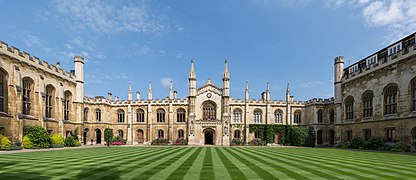By Gavin Mackintosh-
The University of Cambridge has decided to abandon its state school undergraduate admission targets.
This decision entails removing specific quotas for the proportion of private or state school students admitted to the university. Despite this change, the university still intends to consider application from certain schools.
When asked by The Eye Of Media what prompted the change, the university swerved the question for reasons of its own, but presented a statement quoted at the end of this article in relation to its announcement.
‘The University will continue to take into account an applicant’s schooling, particularly if they come from a school which has not seen many applications to Cambridge.
‘Other socio-economic factors will also be considered in the application process to indicate disadvantage of opportunity, as occurs at present. The APP is being drafted at the moment and subject to further discussion around the collegiate University.
‘Consideration of an applicant’s school type in isolation is not a factor that the Office for Students would expect to see as a specific target in the Access and Participation Plan, however.
‘The collegiate University is committed to widening participation and will continue to assess all applicants holistically and in line with Admissions Policy”.
Cambridge is one of Britain’s very best universities, with a high number of its students being straight A pupils at A levels or GCSE’s.
Cambridge has previously been advised to give admission to a quota of pupils from state schools to bridge the advantaged/disadvantaged gap in the system. The implication of meeting those expectations is considered by the university as amounting to the lowering of its academic standards.
Today, The Office for Students told this publication that it had not designated any quota of students for the university to give admission, but advocate for universities like Cambridge to help raise attainment in state schools to provide more opportunities to children from disadvantaged backgrounds.
Cambridge has reportedly surpassed its previous five-year access plan targets, with state school student numbers increasing to 69.1% and new students from state schools reaching just under 73% in the 2022-23 academic year.
However, the university is now developing a new access plan that will cover the academic years from 2025-26 to 2028-29.
The spokesperson emphasized that considerations like an applicant’s school type in isolation will not be a specific target in the access and participation plan, in line with the expectations of the Office for Students.
In March of the previous year, former vice-chancellor Professor Stephen Toope urged private schools to acknowledge that they may see fewer students admitted to Oxford and Cambridge in the future.
Professor Toope emphasized a stance of inclusivity, stating that the university would welcome students from various backgrounds rather than dissuading those from private schools.
The Office For Students did not directly respond to questions from this publication stating whether it agreed with the latest announcement by Cambridge University.
Rather, a statement from John Blake, Director for Fair Access and Participation for the Office for Students (OfS), read:
“In drawing up their access and participation plans, universities should consider how best they can use their experience and resources to eliminate risks to equality of opportunity for students.
“The OfS requires those who want an access and participation plan to set targets within those plans, both to focus activity and for accountability, but these targets ought to be genuinely useful guides to the actual challenges being dealt with.
‘For example, targets around care-experienced students, or those from the poorest households, reflect that such students may have experienced significant disruption or lack of resources in their education or personal lives, and encourage strong focus by the university on how to effectively support students with those experiences.
”Given that over 90 per cent of pupils attend state schools, such a measure alone may provide neither a useful guide nor meaningful accountability for the work a university is committed to.
“We would expect our most selective universities to consider carefully how to deploy their resources to ensure that all students who could practically benefit from their educational offer can access it, for example by undertaking sustained work with schools to help raise attainment among students from disadvantaged backgrounds, but we do not require a target on the proportion of pupils from state schools entering a particular university.”




